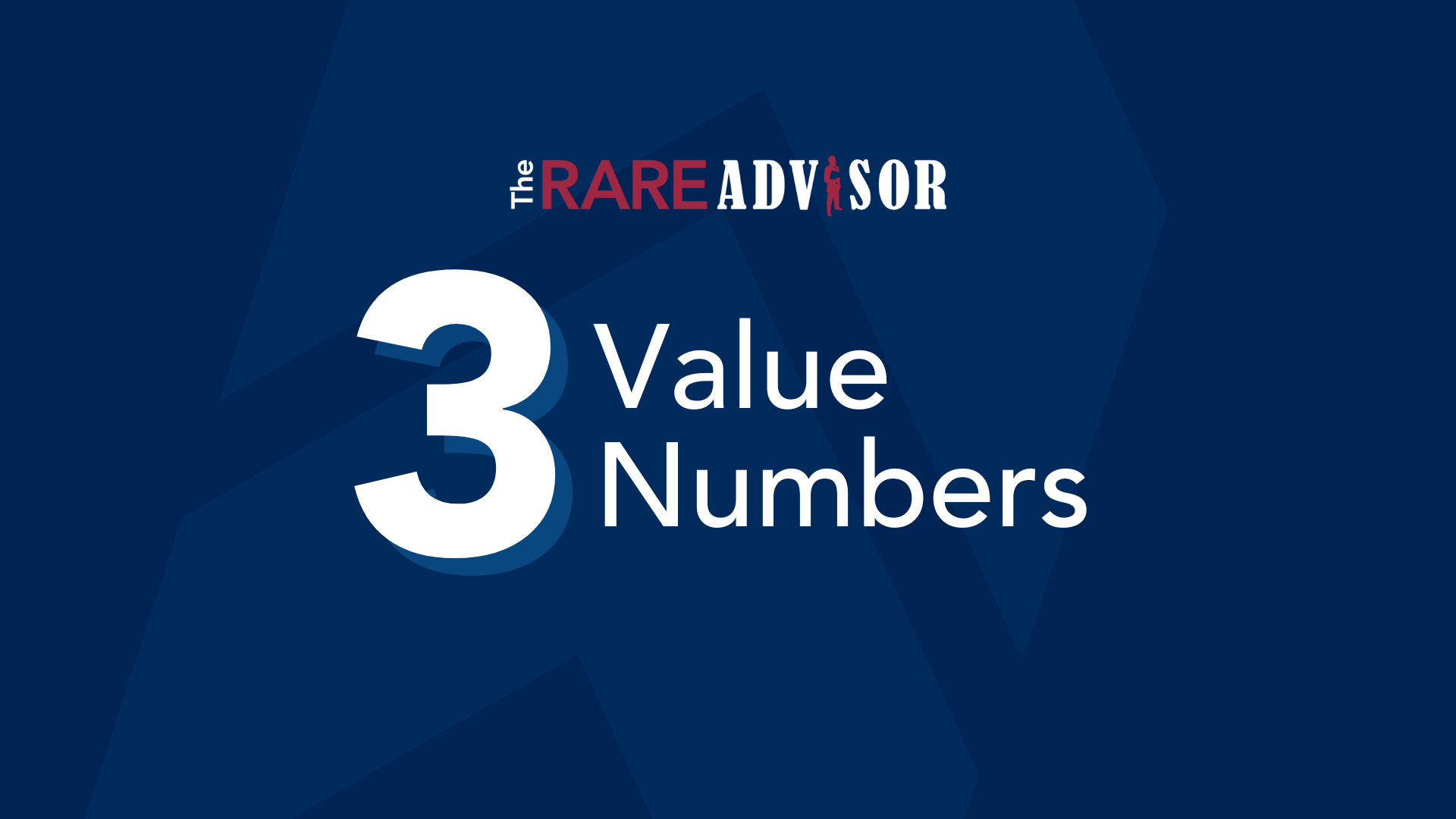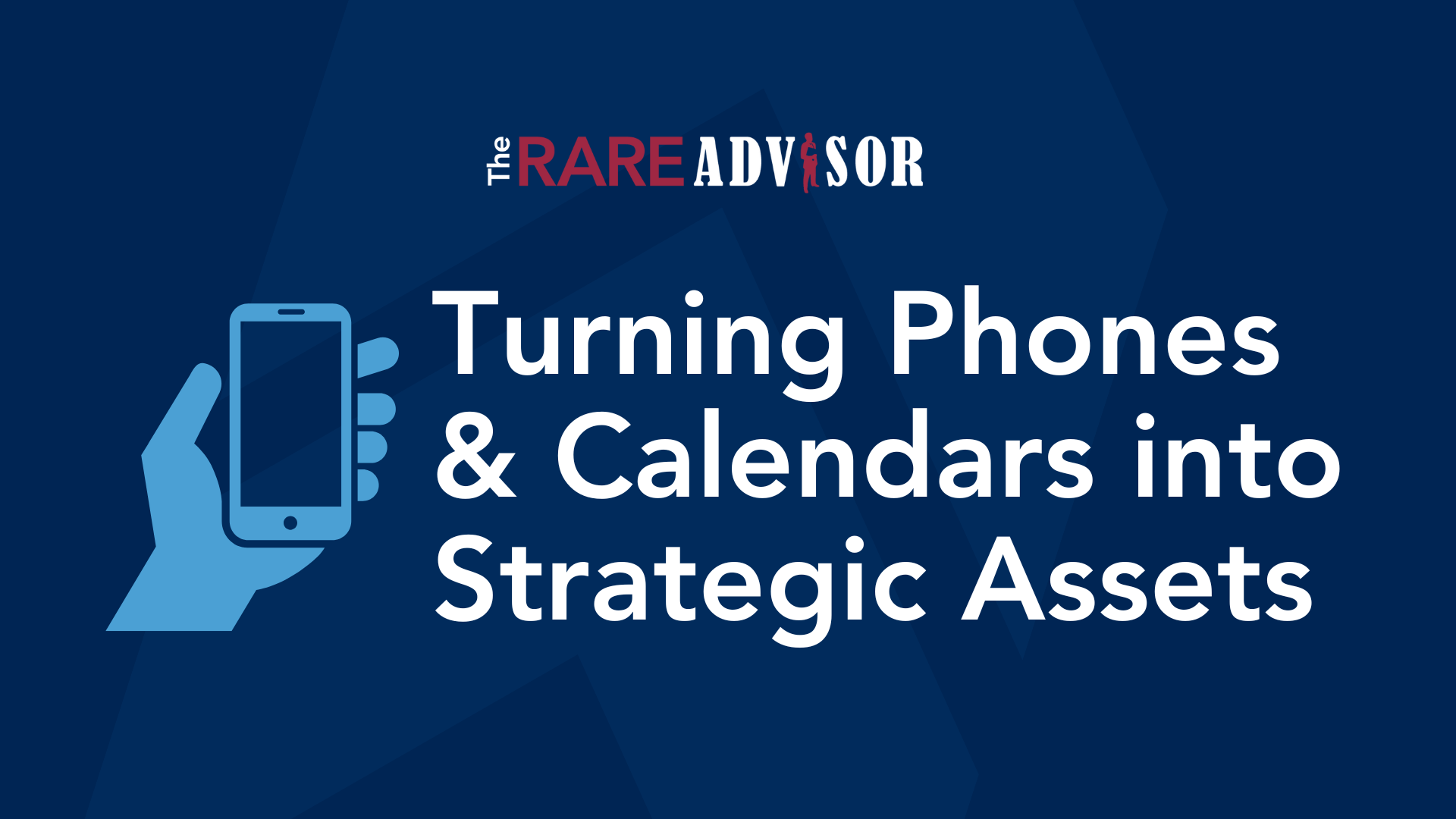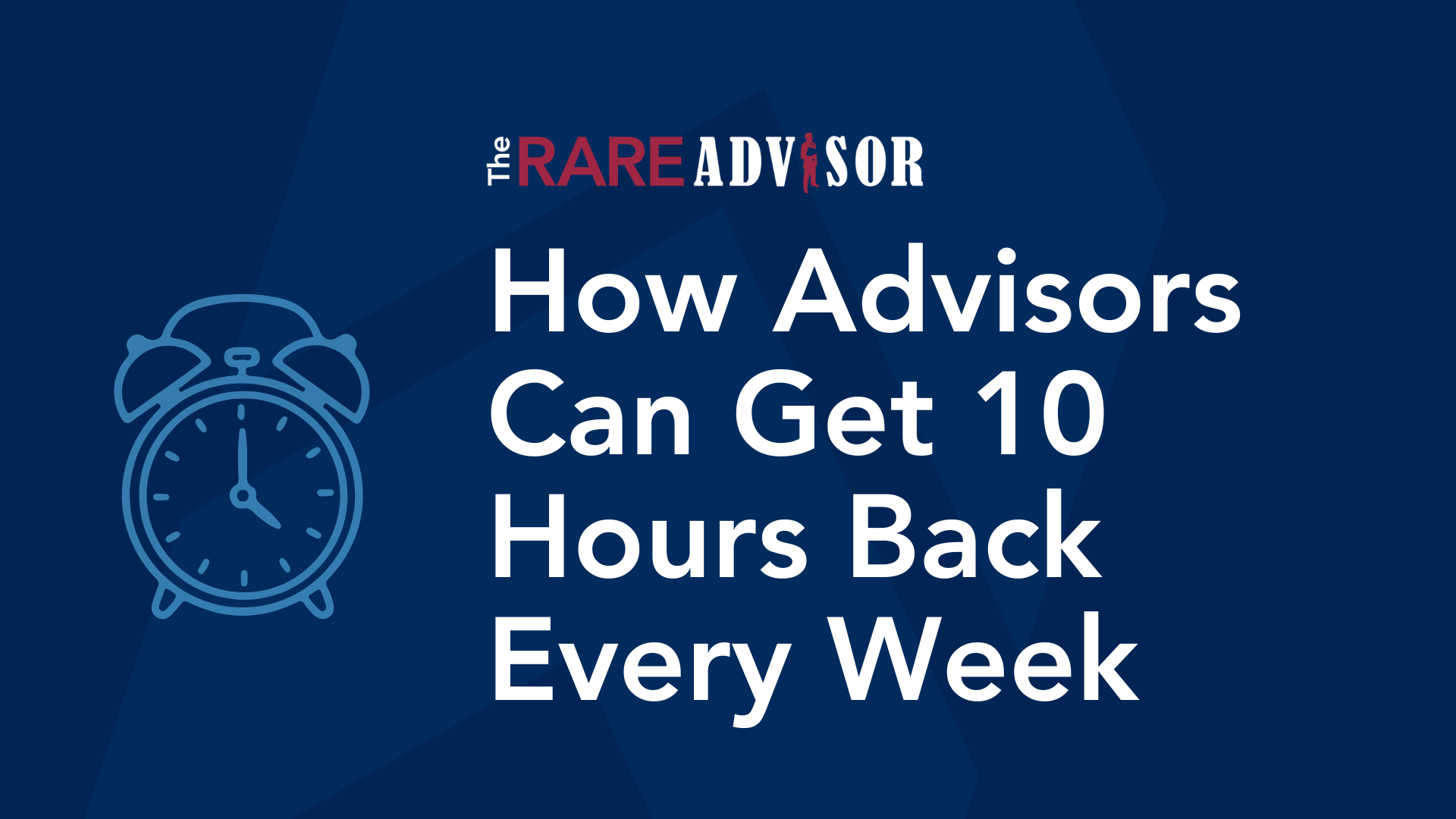The RARE Advisor: The 3 Value Numbers You Need to Know

In this episode of The RARE Advisor, we’re going to take the highly complex subject of valuation and business appraisals and boil it down into just three numbers you need to know.
The world of valuation for your practice can be mind-boggling. And it's important that you understand it because it's not just about the valuation in case you want to transition, retire, create a succession plan, or just outright sell. It's also important because it's the equivalent of your stock price. It's what identifies whether or not you're actually growing, maintaining, or retracting. So, it's really important and a lot of people get confused or overwhelmed by it all - and you don't really need to. I mean, I can talk to you for days about all the intricacies of deals and structure, and different ways to bring your next gen advisors in, and then overlaying it with phantom stock, and a host of other things that we can help you with. But really, to wrap your mind around it, you just need to understand three numbers in order to get your arms around the worth of your practice, or in this example, the worth of your assets under management. Those three numbers are 2.7, 27%, and 10.
The recurring revenue valuation multiple, if you're going off of a valuation of revenue, is 2.7 right now. EBITDA (earnings before interest, taxes, depreciation, and amortization), as a target for financial services, is 27% - it means you should be able to get or retain 27% down to the bottom line. So basically, your net profit. I should be able to get 27% from what I bring in down to the bottom. Now, if you're running a smaller practice, and you're saying, "Well, first of all, I don't even know what EBITDA is. And secondly, I don't have any." Well, you really do. The difference is, you're probably extracting everything out in terms of your income - you get to the end of a quarter or the end of the year, you see how much dollars that you have inside of the practice, and that's what you pull out to live on. Now, what you can do is you can normalize it. You can do add backs, you can figure out what revenue you would pay to replace yourself. What would you pay someone to do your job if you weren't the one doing it? You'd probably pay them less than you're paying yourself. And theoretically, by making that adjustment, you should (if you're running a good practice) be getting 27% down to that EBITDA line. And then we look at EBITDA multiples, which are different than revenue multiples. The revenue multiple is 2.7. The EBITDA multiple is 10.
So that 27% I get to the bottom line, if I multiply that by 10, or if I take my top line number and I multiply it by 2.7, I should get the same number - because it doesn't really matter how you're being valued. There are different valuation methods, but they're there to kind of double check each other, there to make sure that there aren't any weird fluctuations, that one assessment provides a view into that maybe another assessment somehow glossed over. But the reality is, if you're running a clean, normal, all things being equal type of practice, you should get the same number either way.
So, here's an example. If I've got $1 million of EBITDA, and it represents 27% of my overall revenue, then that means my gross revenue is a hair over $3.7 million. So in other words, if I've got $1 million dollars of EBITDA, divide that by 27%, which is that EBITDA benchmark, I'm gonna get $3,703,703. So a hair over 3.7 million. If I take that number, and I multiply it by 2.7, it equals $10 million. If I take $1 million dollars of EBITDA, and I multiply it by 10, what does that equal? $10 million. I get the same answer each way. The three things you need to understand is: 2.7 is the multiple for recurring revenue, 27% is how much EBITDA I should have, and 10 is the multiple on EBITDA. And there you have it.
--
The RARE Advisor is a business model supercharged by Recurring And Repeatable Events. With more than thirty years of working with and coaching successful advisors, host Mike Walters (along with other leaders in the industry), discusses what it takes to grow a successful practice. With the aim of helping financial professionals and financial advisors take their business to the next level, Mike Walters shares insights and success stories that make a real impact. Regardless of the stage of your practice, The RARE Advisor will provide thoughtful guidance, suggestions for developing systems and processes that work, and ideas for creating an authentic experience for your clients.
The RARE Advisor is also a podcast! Subscribe today via Apple Podcasts, Google Podcasts, or your preferred podcast listening service for easier on-the-go listening.
Author Info

Mike Walters is the Chief Executive Officer (CEO) of USA Financial, leading the firm since its inception in 1988. Mike is committed to...
Related Posts

Access by Design: Turning Phones and Calendars into Strategic Assets
In this episode of The RARE Advisor, host Aaron Grady and practice management consultant Allan Oehrlein continue their discussion on time allocation by exploring what comes next: operationalizing structure across the entire advisory team. They break down why the phone is the “front door” to the firm and the calendar is the “engine room,” and how elite practices use standardized phone scripts, the strategic power of the word “unavailable,” intentional scheduling rules, and team empowerment to build consistency, capacity, and trust. Aaron and Allan outline how designed access—not unlimited access—creates scalability and a stronger client experience, while reducing reactivity, burnout, and advisor bottlenecks. They also offer practical challenges advisors can implement immediately to redesign their phone and scheduling processes in ways that elevate both team culture and enterprise value.

The Psychology Behind Your CTA: Why Prospects Don’t Click “Book a Call”
In this episode of Financial Advisor Marketing Playbook, Mark Mersman breaks down the real psychological barriers that stop prospects from clicking “book a call” on an advisor’s website—and how small language and design changes can dramatically improve conversions. You’ll learn practical, compliant fixes including softer CTA language, expectation statements, empathy‑based messaging, simplified design, and reassurance techniques that lower emotional friction. If you want a website that encourages prospects to take the first step confidently, this episode delivers actionable guidance advisors can implement immediately.

How Advisors Can Get 10 Hours Back Every Week
In this episode of The RARE Advisor, host Aaron Grady and USA Financial Pareto coach and Practice Management Consultant Allan Oehrlein dive into time allocation as a core lever for advisory success. They unpack the biggest time drains—email, unsolicited calls, and open-door interruptions—and lay out a practical framework for calendar rebalancing that starts with personal time, management time, client appointments, dedicated communications windows, “work on the business” time, and high-impact growth activities. With real-world stories showing how advisors shift from reactive days to structured weeks (and even reclaim Fridays), Aaron and Allan share easy-to-implement tips: color coding calendars, scheduling buffers, daily huddles, and call/appointment protocols. If you’re ready to audit your calendar, define your ideal week, and create structure that truly liberates your practice, this conversation is your next step.

Access by Design: Turning Phones and Calendars into Strategic Assets
In this episode of The RARE Advisor, host Aaron Grady and practice management consultant Allan Oehrlein continue their discussion on time allocation by exploring what comes next: operationalizing structure across the entire advisory team. They break down why the phone is the “front door” to the firm and the calendar is the “engine room,” and how elite practices use standardized phone scripts, the strategic power of the word “unavailable,” intentional scheduling rules, and team empowerment to build consistency, capacity, and trust. Aaron and Allan outline how designed access—not unlimited access—creates scalability and a stronger client experience, while reducing reactivity, burnout, and advisor bottlenecks. They also offer practical challenges advisors can implement immediately to redesign their phone and scheduling processes in ways that elevate both team culture and enterprise value.

The Psychology Behind Your CTA: Why Prospects Don’t Click “Book a Call”
In this episode of Financial Advisor Marketing Playbook, Mark Mersman breaks down the real psychological barriers that stop prospects from clicking “book a call” on an advisor’s website—and how small language and design changes can dramatically improve conversions. You’ll learn practical, compliant fixes including softer CTA language, expectation statements, empathy‑based messaging, simplified design, and reassurance techniques that lower emotional friction. If you want a website that encourages prospects to take the first step confidently, this episode delivers actionable guidance advisors can implement immediately.

How Advisors Can Get 10 Hours Back Every Week
In this episode of The RARE Advisor, host Aaron Grady and USA Financial Pareto coach and Practice Management Consultant Allan Oehrlein dive into time allocation as a core lever for advisory success. They unpack the biggest time drains—email, unsolicited calls, and open-door interruptions—and lay out a practical framework for calendar rebalancing that starts with personal time, management time, client appointments, dedicated communications windows, “work on the business” time, and high-impact growth activities. With real-world stories showing how advisors shift from reactive days to structured weeks (and even reclaim Fridays), Aaron and Allan share easy-to-implement tips: color coding calendars, scheduling buffers, daily huddles, and call/appointment protocols. If you’re ready to audit your calendar, define your ideal week, and create structure that truly liberates your practice, this conversation is your next step.

